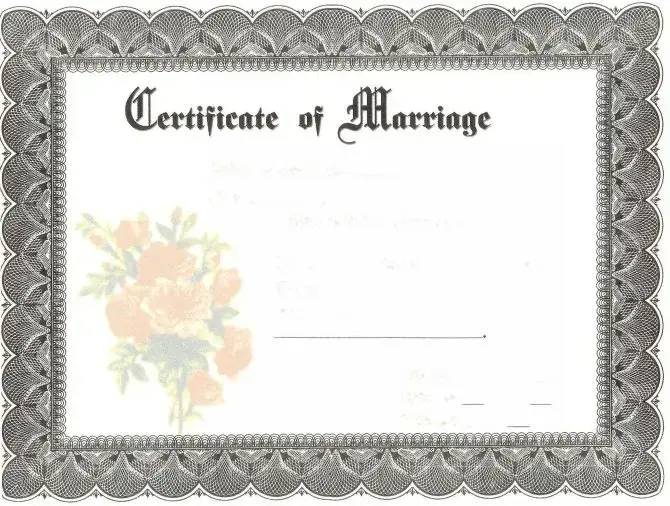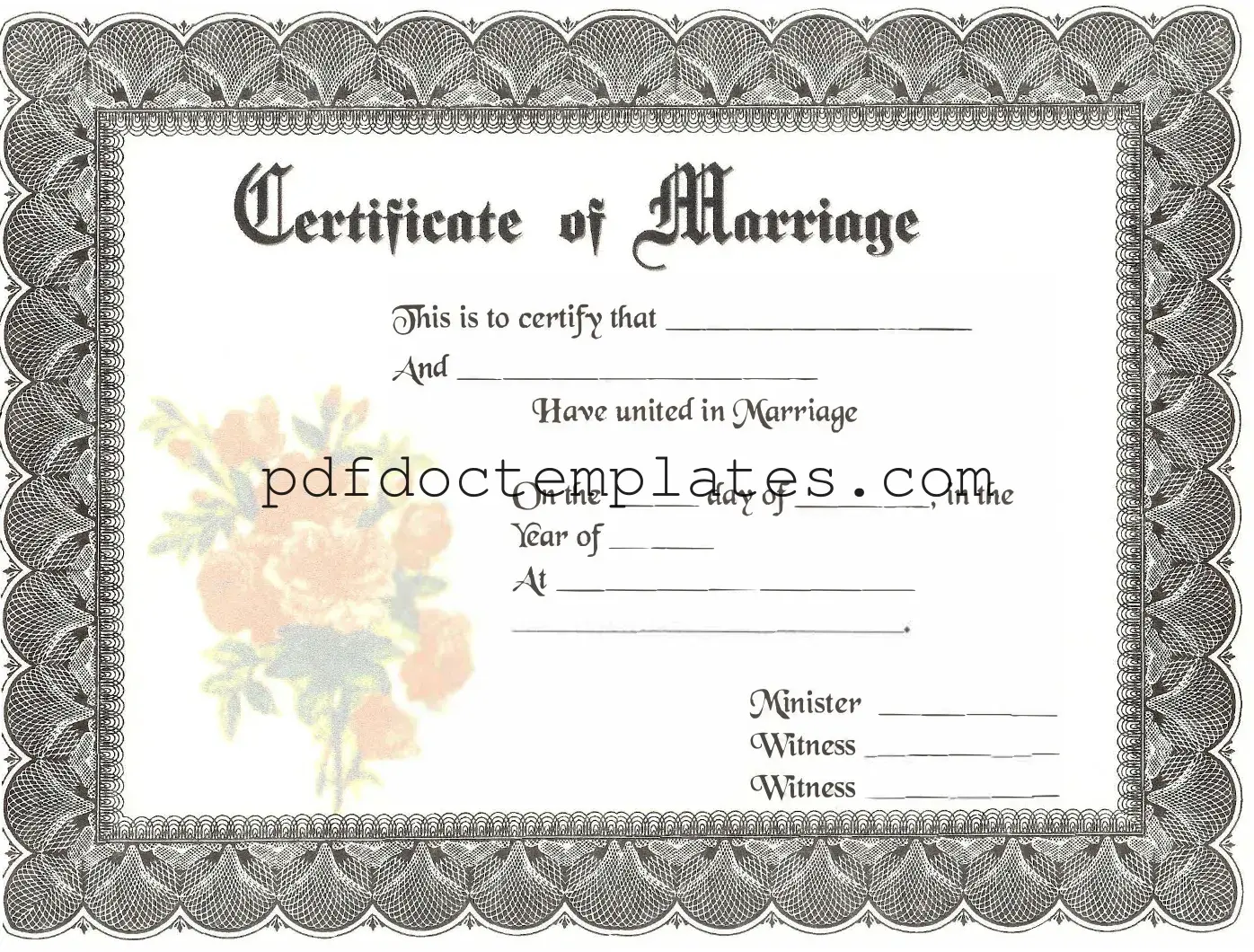Download Marriage Certificate Template
Misconceptions
When it comes to marriage certificates, there are several misconceptions that can lead to confusion. Understanding the facts can help ensure a smooth process for couples looking to formalize their union. Here are six common misconceptions about the marriage certificate form:
-
Misconception 1: A marriage certificate is the same as a marriage license.
This is not true. A marriage license is what you obtain before the wedding, allowing you to marry. A marriage certificate, on the other hand, is the official document that proves the marriage has taken place.
-
Misconception 2: You can get a marriage certificate immediately after the ceremony.
In most cases, this is incorrect. After the wedding, the officiant must file the marriage license with the appropriate government office. Only after this is done will you receive your official marriage certificate, which can take some time.
-
Misconception 3: All states have the same requirements for obtaining a marriage certificate.
This is a common misunderstanding. Each state has its own rules and regulations regarding marriage certificates, including fees, waiting periods, and identification requirements. Always check the specific requirements for your state.
-
Misconception 4: You need to have a wedding ceremony to obtain a marriage certificate.
This is not entirely accurate. While a ceremony is a common way to celebrate a marriage, some couples may choose a civil ceremony or even elope. As long as the marriage license is valid and filed correctly, a marriage certificate can be issued.
-
Misconception 5: Once you have a marriage certificate, it cannot be changed.
This is misleading. If you need to correct information on your marriage certificate, such as a misspelled name, you can usually request a correction through the issuing office. There may be specific procedures to follow.
-
Misconception 6: A marriage certificate is only necessary for legal purposes.
While it is indeed a legal document, a marriage certificate also serves personal and sentimental purposes. Many couples cherish this document as a symbol of their commitment and may wish to display it in their home.
Understanding these misconceptions can help couples navigate the process of obtaining their marriage certificate with greater ease and confidence.
File Details
| Fact Name | Description |
|---|---|
| Purpose | A marriage certificate serves as an official record of a marriage, providing proof of the union between two individuals. |
| Required Information | The form typically requires the full names of both parties, the date of the marriage, and the location where the marriage took place. |
| Governing Laws | In the United States, marriage certificates are governed by state laws, which can vary significantly from one state to another. |
| Application Process | Couples must apply for a marriage certificate through their local or state government office, often requiring identification and a fee. |
| Availability | Marriage certificates are generally available to the couple and may also be obtained by certain family members, depending on state laws. |
| Importance for Legal Matters | This document is often required for legal matters such as name changes, spousal benefits, and divorce proceedings. |
| Amendments | If there are errors on the marriage certificate, couples can request amendments through the appropriate state agency. |
Key takeaways
When filling out and using a Marriage Certificate form, there are several important points to keep in mind. Here are some key takeaways:
- Ensure that both partners' names are spelled correctly. Any errors can cause delays in processing.
- Check the required identification documents. Most jurisdictions will ask for specific forms of ID.
- Fill out all sections of the form completely. Incomplete forms may be rejected.
- Be aware of any waiting periods in your state. Some states require a waiting period before the marriage can be officiated.
- Understand the fees involved. There may be costs associated with obtaining the certificate.
- Know where to submit the form. Different states have different offices for processing marriage certificates.
- Keep a copy of the completed form for your records. It’s important to have documentation of your application.
- Follow up if you don’t receive your certificate in the expected time frame. It’s important to ensure that everything is processed correctly.
Dos and Don'ts
Filling out a Marriage Certificate form is an important step in your journey together. To ensure the process goes smoothly, here are some key dos and don'ts to keep in mind.
- Do double-check all personal information for accuracy.
- Do use your legal names as they appear on your identification.
- Do ensure both parties sign the form where required.
- Do provide all necessary documentation, such as identification and any previous marriage dissolution papers.
- Don't leave any sections blank; fill in every required field.
- Don't use nicknames or informal names on the form.
- Don't forget to review the form for any errors before submission.
Following these guidelines will help you complete the Marriage Certificate form correctly, paving the way for your special day.
Common mistakes
-
Failing to provide accurate personal information. This includes names, dates of birth, and places of birth. Inaccuracies can lead to delays or complications.
-
Not checking for spelling errors. Even minor mistakes in names can create issues later on.
-
Omitting required signatures. Both parties must sign the form, and missing signatures can invalidate the application.
-
Using outdated forms. Always ensure you are using the most current version of the marriage certificate form, as requirements may change.
-
Neglecting to provide identification. Most jurisdictions require valid ID to accompany the application, and failure to provide this can result in denial.
-
Misunderstanding residency requirements. Some states have specific residency rules that must be followed, and not adhering to these can complicate the process.
-
Forgetting to include witnesses' information. Many states require the names and addresses of witnesses, and leaving this out can lead to issues.
-
Not paying the required fee. Each jurisdiction has its own fee structure, and failure to include payment can halt the application process.
-
Ignoring deadlines. Some states have time limits for submitting the marriage certificate application, and missing these can result in additional complications.
-
Assuming the process is the same everywhere. Each state has its own laws and procedures regarding marriage certificates, and it is essential to research the specific requirements for your location.
What You Should Know About This Form
-
What is a marriage certificate?
A marriage certificate is a legal document that officially records the marriage between two individuals. It serves as proof of the marriage and is often required for various legal purposes, such as changing your name, applying for spousal benefits, or filing taxes jointly.
-
How do I obtain a marriage certificate?
To obtain a marriage certificate, you typically need to apply through the office of vital records in the state where the marriage took place. You may need to provide identification, fill out an application form, and pay a fee. Some states allow online applications, while others require you to apply in person or by mail.
-
What information is required to fill out the marriage certificate form?
When completing the marriage certificate form, you will usually need to provide personal information such as:
- Your full names
- Your dates of birth
- Your places of birth
- Your addresses
- Your parents' names
- Any previous marriage information, if applicable
-
Do I need witnesses to get a marriage certificate?
In many states, you will need at least one or two witnesses to sign the marriage certificate during the ceremony. These witnesses must be of legal age and can be friends, family members, or anyone who is present at the wedding. Check your state’s requirements for specific details.
-
How long does it take to receive the marriage certificate?
The time it takes to receive your marriage certificate can vary by state and the method of application. In general, it can take anywhere from a few days to several weeks. If you need it quickly, ask if expedited services are available for an additional fee.
-
Can I request a copy of my marriage certificate later?
Yes, you can request a copy of your marriage certificate after the wedding. You will need to contact the vital records office in the state where you were married. Be prepared to provide your identification and possibly pay a fee for the copy.
-
What if I lose my marriage certificate?
If you lose your marriage certificate, you can obtain a replacement by applying for a new copy through the vital records office. Follow the same process as when you first obtained the certificate, including providing identification and paying any applicable fees.
Marriage Certificate Example

@Ji |
if |
|
|
is is to cert y tftat _______ |
|||
A_ |
|
|
|
nd ________ |
|||
|
� |
g |
|
|
СИаvс unitcd in |
|
|
|
rria c |
||
|
y |
f |
___, in tftc |
|
o |
||
|
Оп tftc __ da |
||
|
|||
� |
__ |
|
nistcr |
||
|
_ |
_ |
C\Vitness ___ |
_ |
|
C\Vitncss _____ |
||
Consider More Forms
Goodwill Donation Form - Made official by the Goodwill organization.
To effectively manage an LLC in New York, it is essential to utilize the New York Operating Agreement form, which provides a framework for the company's operations and clarifies each member's rights and responsibilities. This document plays a pivotal role in aligning the members of the LLC and can significantly reduce the potential for disputes. For those looking for comprehensive resources, you can access various templates and guidance through All New York Forms, ensuring a well-structured agreement that meets legal requirements.
State Form 43230 - Owners must complete certain details including vehicle make and model.
